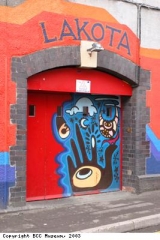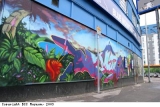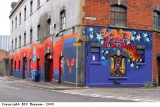Bristol’s music scene
Bristol is a city rich in musical pioneers. Tricky, Roni Size, and Massive Attack are just a few of the internationally renowned musicians from the city. Such names today have an important place in Bristol’s musical heritage. Despite their stardom, such artists still take an interest in local issues; for example, local charities benefited from a Massive Attack performance in Queen’s Square, 2003. The band also uses their positions to voice opinions on behalf of local communities, refusing to play, for example, at the Colston Hall, Bristol’s major music venue. This is because the hall is named after Edward Colston, who was linked to the transatlantic slave trade. Roni Size, another artist from Bristol, works with the city’s disadvantaged youths on projects such as the Basement Project.
In Bristol in the late 1970s there were DJs such as Dennis Richard, Martin Star, Seymour, and Superfly playing what was called ‘funk’ and ‘disco’. They were playing in local clubs such as The Granary, Le Carno, Charlottes and Top Cat. More specialised clubs then started opening up, such as The Dug Out. These places were more relaxed, and unlike some of the other clubs, they did not have a strict door policy. The musicians were both black and white and the audiences were increasingly mixed. It was in these venues that people from all areas of Bristol would meet as they listened to the early Wild Bunch DJs Nellee Hooper and Miles Johnson. As Nellee Hooper says of the Dug-Out club, “The Dug-Out couldn’t have a better location at the top of the hill from St Pauls – the heart of the black music scene – and just down the hill from Clifton and the trendy punk/art scene, just dangerous enough for trendies to feel edgy, music cool and edgy enough to confuse and enthuse the dreads … perfect!!” .
Big reggae stars like Gregory Isaacs or Dennis Brown played at the local Top Rank club as part of their tours, while other areas of Bristol swayed to the sounds of reggae at less official venues. Bristol-based reggae sound systems, such as the local St. Paul’s band Black Roots, were playing the circuit of black community centres around the country.
In the early 1980s competing ‘crews’ like The Wild Bunch (who later became Massive Attack), 2Bad, City Rockers, UD4 (Roni Size’s brother) and FBI Crew were battling it out on home-built speaker systems, modelled after those in Jamaica in the Caribbean. The Wild Bunch became legendary for their much-attended parties at which their music sets combined punk, reggae and Rhythm and Blues. They played at local events, such as St Pauls Carnival and in disused or empty buildings in or close to the St. Pauls area. After the St. Pauls riots in 1980, the police avoided the area, which made such gigs possible. Young people of all colours became obsessed with the emerging hip-hop music.
Massive Attack, Tricky, Soul II Soul’s Nellee Hooper, and Smith & Mighty sprang from the 1980s eclecticism of Bristol sound. Reprazent, a drum n’ bass collective including Roni Size followed suit. No wonder Roni says that “you can’t do the Bristol sound justice by saying that it’s one thing. It’s many things – a party vibe, a deep vibe – it changes”.
Despite travelling the world, Reprazent are still based in Bristol. The city’s African-Caribbean community hold the collective in high regard, as Roni Size comments: “When people see people like me from our community in magazines or see me spin records or hear my records play on radio. They start to get hope and they think: “if he can do it, I can do it”. It gives these people some kind of trust, they call our music their music. In that way we have started our own movement, act like our own government. Because that’s what a government is supposed to do, get peoples hope up.”
Music has always played a major role in the community of Bristol. Roni grew up in Bristol and was influenced by the music around him. As he states, “We used to have sound systems in schools. Think about it, a normal school with all the windows shaking because of the sound. That was a normal thing back then and things like that are still happening. I always wanted to be involved with music, but at first there was no way I could do that. I had no money to buy a Technics [a turntable for playing records on] or a sampler, the only thing I could make music with was by human beatboxing into a microphone. But I had to find something I could relate to and that’s why I went to do youth work stuff.”
Bristol is still a vibrant musical centre. For example, turntable DJ Mad Cut, still in his early twenties, last year won Britain’s most prestigious ‘scratching’-specialist awards – the National DMC Championships. He makes regular trips to London and has visited America several times, mixing with the likes of Krissy Kris. Another contemporary Bristol success story is Aspects. Their album, Correct English has won much media praise. This year has seen a massive increase in British hip-hop sales and Bristol hip-hop is the biggest seller of all. Bristol is home to numerous record labels and clubs, which are home to and support a wide range of local sounds.





